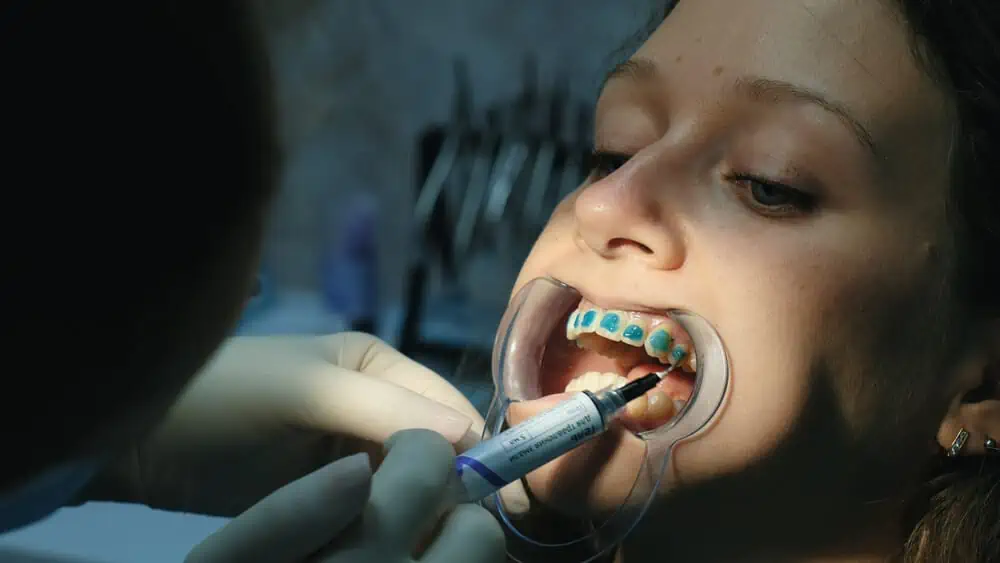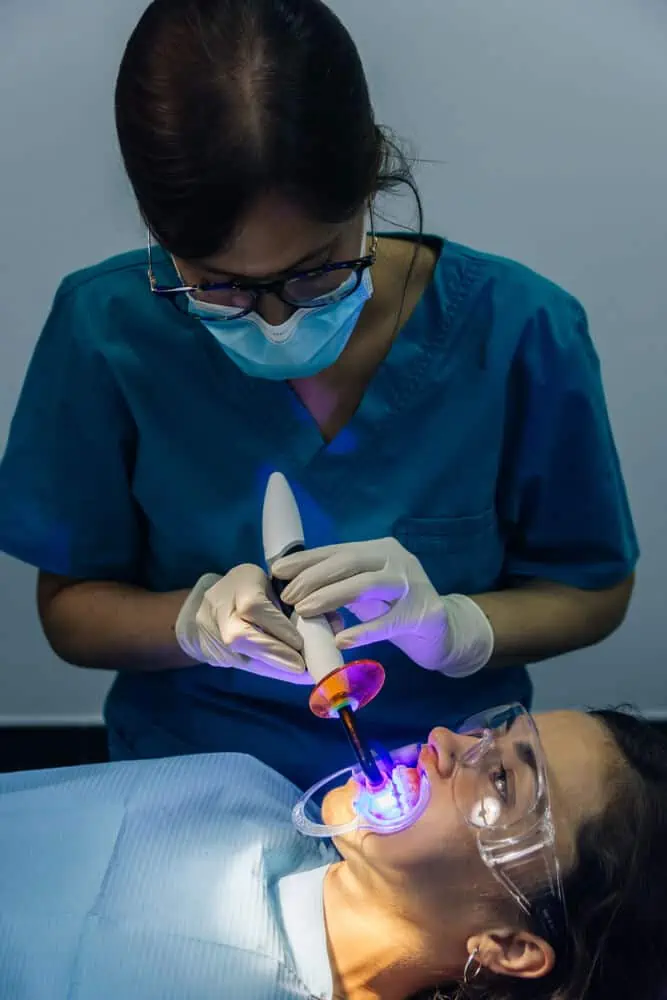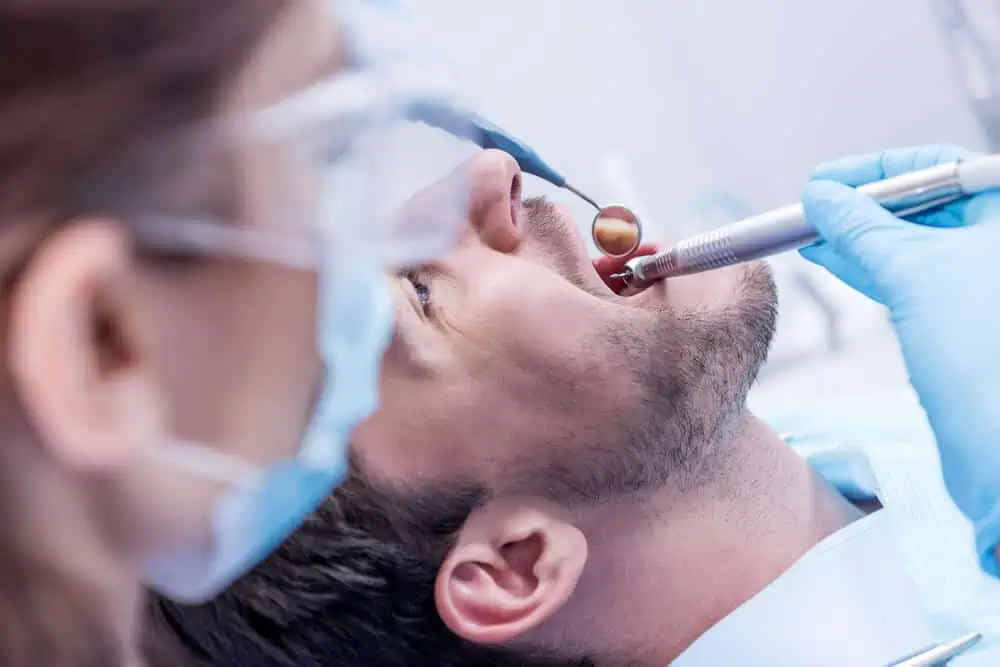Unexpected dental emergencies can occur, even with consistent oral hygiene. Whether you're dealing with a sudden broken tooth or need urgent dental restorations, there's a reliable and efficient solution that doesn't involve resorting to craft glue: dental glue.
This guide dives into:
We will also cover temporary home tooth repair kits, offering you immediate solutions until you can see a dentist. Stay informed and prepared for dental emergencies with our comprehensive guide.
Table of contents
What is dental glue?
Dental glue, also known as dental cement, tooth glue, or tooth crown glue, is used by dentists for securing a dental implant or restoration (a fixed bridge, inlay, onlay, or crown) to your damaged teeth.
Dental glue for a broken tooth can be purchased over the counter, but in this case, it is only meant for very temporary treatment. Dental glue does its magic invisibly, making sure your teeth stay in place and your confidence shines with each smile.


Dental cements possess unique chemical features that aid in achieving their purpose: to ensure that the carefully crafted dental restorations stay exactly where they should be—in your mouth.
Dental glue is usually advertised as a short-term fix for chipped teeth, damaged veneers, and broken crowns. However, some newer products have been launched which can be used as a long-term solution as well.
Let's take a brief look at how dental glue actually works.
How does dental glue work?
Dental glue works by using compression. In some types of dental cement, a chemical bond occurs. The force exerted by the compressed dental glue under the tooth crown holds and bonds it together. The chemical bond formed between the glue and the crown provides extra strength and it is less likely to break down compared to glue that does not form bonds.
However, because chemically bonded dental cement possesses higher strength, it may cause difficulties during the removal of crowns for repair or replacement purposes.
Stronger dental cement is a great option for those who continually grind their teeth as it can provide additional stability to the crowns and keep them intact for a longer duration of time.
Would you like to speak to a dentist about dental cement, or get an assessment of your dental problem?
Find a dentist near you now by calling 866-383-0748. You will be connected to a live operator who will put you through to a qualified dentist in your area.
Alternatively, if you're not sure you want to make an in-office appointment just yet, you may want to see a dentist online first. If you're curious to find out more about how teledentistry works, you can read our separate article about online dentists.
Types of dental glue: permanent vs temporary
There are dental glues for teeth classified according to their application.
Type of cement | Application |
Type I(a) | Fine grains used for luting and cementation |
Type I(b) | Medium grain used for orthodontic purposes |
Type II | Used for restorative purposes |
Type III | Used for liners or base applications |
Dental glue for crowns and other restorations are classified differently based on their duration of use and composition.
When it comes to durability, dental cements are simply classed as ‘temporary' or ‘permanent'.
Temporary dental glue
Temporary cement is a part of the temporary filling kit which is commonly used to fix crowns and other restorations for a short duration of time.
A dentist uses this kind of dental crown glue in circumstances where they wish to observe and assess the response of your teeth to the restoration in use.
Temporary cements are usually made up of eugenol, olive oil, and zinc oxide powder.
Temporary dental glue features the following aspects:
- Provides a good grip on teeth as well as on the dental crowns
- Easily tolerated by the surrounding tissue
- Easy to remove
- Protects a damaged tooth and helps minimize its sensitivity
- Saliva helps it dissolve in a short period of time. Because of this, temporary glue must be replaced with permanent glue in 3 to 6 weeks following its application
- Possesses a low resistance
Permanent dental glue


Permanent dental glue is the type of teeth glue used for fixing various dental restorations on a permanent basis. In contrast to temporary dental glue, permanent glue is made up of hard and brittle materials obtained by mixing liquid and powder together.
These are the features of a permanent dental glue:
- Creates a strong bond with the tooth and the restoration to provide long-term, permanent protection
- Easily tolerated by the surrounding tissue, thereby preventing dead teeth and tissue.
- Provides good sealing at the margins to prevent leakage
- Protects the dental tissue from all sorts of external stimuli
- Provides exceptional resistance
- Does not dissolve in saliva or any other oral liquid, thereby offering permanent protection
Types of dental glue: composition
Depending on what it's made of, dental cement can be divided into six types:
Glass ionomer cement
Glass ionomer cement is made from powdered glass mixed with an acid. It is used for the final cementation of bridges and crowns made from alloys, but it doesn't adhere to porcelain. Glass ionomer cement is often the material of choice for filling children's milk teeth, too. Below is a video bout glass ionomer cement:
Bioceramic cement
Bioceramic dental cement is a permanent adhesive agent that appears opaque on X-rays. It's commonly used for endodontic (root canal) work because it is biocompatible, meaning it can either function as natural tissue or encourage the regeneration of tissue.
Zinc oxide eugenol cement
Zinc oxide cement is an oil-based glue used to soothe the pulp of a broken tooth. It is usually avoided in cases where permanency is required. This cement is particularly helpful to temporarily cement a tooth with exposed dentine. Nowadays, many companies add different splinting agents to the zinc oxide cement to grant it permanent luting effects.
Zinc oxide eugenol is not considered to be a strong product for cementing most types of dental restorations, and its use is normally limited to gluing stainless steel crowns, acrylic crowns, and cast restorations.
Zinc phosphate cement
Zinc phosphate cement was one of the first permanent cements to be used in dentistry, and it remains in wide use today for a variety of permanent restoration purposes.
Although it doesn't chemically bond to the tooth surface, it has exhibited significant long-term success. However, it is gradually becoming less popular because its relatively high acidity can irritate tooth pulp.
Adhesive resin cement
Adhesive resin cement is a permanent dental glue that bonds with most ceramic and alloy restorations, except implant-supported crowns, veneers, indirect resin restorations, and bridges.
Aesthetic resin cement
Aesthetic resin cement contains translucent resins that are available in different shades, meaning it can be made to match the natural tooth color. It is normally used for bonding all-ceramic and indirect composite restorations, including repairing a chipped tooth.
This type of glue has high resistance and utility and a unique composition that does not break apart or dissolve.
How do dentists choose dental glue?
Dentists choose dental glue based on the following three factors:
Longevity
Longevity is one of the main factors that the dentist will consider when choosing the best glue for you. For instance, they may use a temporary or a permanent glue depending on how long you need the crown.
Durability
Durability really matters when it comes to choosing the right kind of dental glue, and it basically depends on the type of restoration used.
Permanent dental glue provides good durability and is used for keeping long-term crowns and bridges in place. In contrast, people who do not require a hard finish can try the eugenol-free glue.
Aesthetics
Depending upon your aesthetic requirements, dentists may choose different sorts of dental glue. For example, most people get temporary glue made with resin because its base is clear in color and it is aesthetically pleasing.
At the same time, this type of glue is difficult to remove and may get discolored easily. So, all these factors must be kept in mind when deciding the right type of dental glue.
Application techniques
There are a number of steps that dentists usually follow in order to apply the glue. In this scenario, we will discuss its application in reference to broken crowns.


- The mouth is properly cleaned followed by cleaning and disinfection of the crowns. The dentist usually puts a rubber dam or cotton rolls in the mouth to get rid of any fluid.
- The glue is prepared according to the instructions until the desired consistency is achieved.
- The dental glue is then applied to the interior of the crown in such a way that it covers it completely.
- The dentist then places the crown on the abutment of the tooth in order to prevent any misplacement.
- After the restoration process is completed, all extra glue is cleared away.
After the process, the patient is advised to maintain good oral health and keep in touch with the dentist.
Can you use super glue on your teeth?
You can't use super glue on your teeth. “Super glue” is the commercial name for cyanoacrylate adhesives meant for some household and medical purposes. This type of adhesive is not meant for internal use. Don't use superglue as a dental glue. Some people may even have an asthmatic or a skin reaction as soon as they come in contact with superglue.
Super glue may also have a serious reaction with different types of natural fibers, for example, cotton which is commonly used in dental procedures. These reactions exacerbate the release of toxic fumes and may even lead to combustion,
Furthermore, super glue can form instant bonds with your skin. You could easily end up with your restoration glued to your own finger or your finger to your tooth, lips, tongue, or cheeks while trying to fix your broken tooth!
Instead of using household glue to try and fix your teeth, there are specially designed kits you can use for temporary filling repair if your filling fell out, or tooth replacement.
Conclusion
Dental glue is an amazing creation designed to hold your damaged tooth together and protect it from further damage. It can provide both short-term and long-term benefits, but must only be used under the supervision of your dentist.
After any procedure involving dental glue to repair your teeth, take extra care regarding your oral health and visit your dentist once or twice a year at least, depending on the recommendation of your dentist, to make sure that everything continues to be in order.
If you still have questions about dental glue, why not consult with a dentist? Find yours now by calling 866-383-0748.
FAQs
What glue can you use on teeth?
Only special dental adhesives should be applied to your teeth. For instance, if you attempt to use superglue, it could end up permanently damaging your tooth, eventually requiring a total tooth extraction.
How can you care for a dental crown with temporary dental glue?
When you get a temporary dental crown that is going to stay in your mouth for a couple of weeks, it is crucial to take care of it. Along with maintaining good oral hygiene, try these tips.
- Avoid chewing on the side with the affected tooth
- Avoid consuming hard-to-chew or sticky foods
- Inform your dentist if any discomfort arises
My crown fixed with temporary glue just fell off. Do I have to go back to the dentist or can I glue it back on myself?
If your temporary crown falls off you should make an appointment to see your dentist as soon as possible. In the meantime, you can buy OTC dental glue to fix it. This is not a permanent solution, and will only last a couple of days.
American Journal of Materials Science and Engineering: A review of conventional and contemporary luting agents used in dentistry. Consulted 4th February 2020.
British Dental Journal: Properties of zinc oxide-eugenol impression pastes. Consulted 4th February 2020.
British Dental Journal: Condensable metal-reinforced glass ionomer cements in primary molars. Consulted 4th February 2020.
Inside Dentistry: An Overview of Permanent Cements. Consulted 23 April 2020.
NCBI: Bioceramics in endodontics – a review. Consulted 23rd April 2020.




